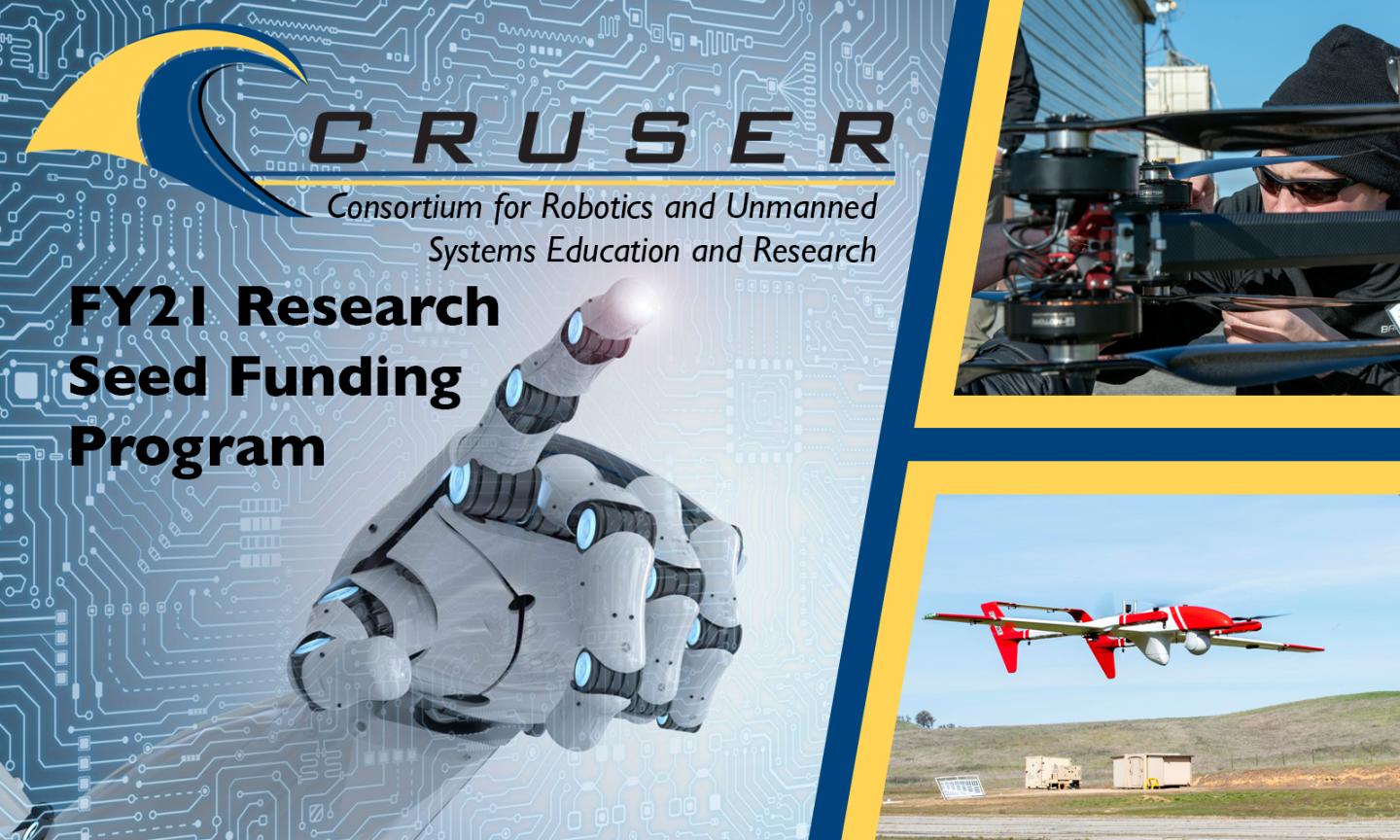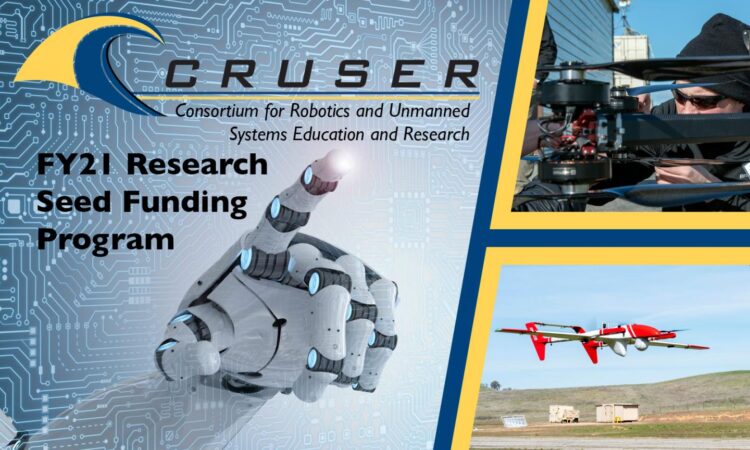
Credit: U.S. Navy graphic by MC2 Nathan K. Serpico
Key to the nation’s future advantage in autonomous systems, the Naval Postgraduate School’s (NPS) Consortium of Robotics and Unmanned Systems Education and Research (CRUSER) approved FY21 funding for novel research in robotics and autonomous systems through its Seed Research Program. This program provides NPS faculty and researchers with funding intended to “seed” important research projects devoted to advancing autonomous solutions from the NPS campus.
Established in 2011, CRUSER supports the Navy’s goals and objectives in developing maritime applications of robotics, automation and unmanned systems as well as shaping the next generation of naval officers through education, research, concept generation and experimentation. Aiding in these goals, the CRUSER Seed Research Program supports research toward the maritime application of robotics and autonomy thereby fostering a rich, relevant research opportunity for faculty and students.
According to CRUSER Associate Director Dr. Carl Oros, the Seed Research Program is a key component of how CRUSER fosters an environment for students, faculty and staff to collaborate, both internally and externally, with the common goal of developing and fielding unmanned systems across the Department of the Navy.
“CRUSER views the [robotics and autonomous systems] field as inherently transdisciplinary and CRUSER-sponsored research spans disciplines from physics, engineering, computer science, cognitive science, as well as the other human-social implications of autonomy involving ethics, trust, law, policy and acquisitions,” said Oros. “This seed research funding helps NPS researchers working on a variety of challenging problems associated with integrating [robotics and autonomous systems] in naval tactical and operational concepts.
“Our motto is ‘from technical to ethical, from concept generation to experimentation,'” Oros added.
The critical research areas include advancement of acoustic sensing, swarming, autonomous behaviors and navigation, C2 architectures, human-machine teaming and trust, counter unmanned aerial systems, and meteorological research to improve unmanned systems sensors and weapons systems.
Each year, research proposals are submitted by NPS faculty based on research themes related to the Warfare Innovation Continuum (WIC) workshops, with this year’s themes evolving through discussions with CRUSER’s funding sponsor, the Office of Naval Research. A selection committee, comprised of the CRUSER Director and previous directors, the NPS Dean of Research, and NPS senior military service representatives and multiple warfighting chairs then meet to discuss and provide input for selecting the top funding priorities.
While CRUSER is able to provide significant funding to projects across campus, not all proposal submissions are able to receive funding so a selection process must take place. This year alone, there were 44 proposals received requesting more than $7 million in funding; much more than CRUSER is able to support.
“This made the selection process extremely challenging as we were not able to fund all of the great research taking place on campus,” stated Oros.
The current fiscal year funding will provide financial support for a variety of robotics and autonomous systems projects that aim to address key warfighter challenges, including understanding the ethics involved with these various capabilities.
“The on-going focus on autonomous multi-vehicle systems implicitly requires consideration of not only technical and operational aspects of these systems, but also the legal and ethical aspects,” noted seed funding recipient Navy Cmdr. Kathleen Giles, NPS Permanent Military Professor in the Systems Engineering Department.
Along with the development of these robotic and autonomous systems, operating these vehicles to their full capabilities is multifaceted with both the autonomous system and their human operator needing to work in a cohesive manner.
This human-machine interaction is just one of the multiple aspects that Giles and her team will be addressing during their experimentation.
In order to progress in the technical and ethical domains of robotics and autonomous systems, collaboration is essential. A few groups are using a collaborative effort between NPS faculty and research partners from other academic institutions, such as University of Alabama – Huntsville and Arizona State University. The most integral collaboration, however, will occur between field disciplines.
“The nature of human-robot interaction is inherently multidisciplinary,” said Assistant Professor Robert Semmens, also a funding recipient from NPS’ Systems Engineering Department. “On the technology side, you need engineers and computer scientists to make the system work and make the capability even come around. On the human side, it calls for psychology and human factors. Further, there are the broader sociological and ethical considerations that surround the interaction between the human and the technology.”
According to Oros, CRUSER will continue advocating for robotics and autonomous systems education and research on campus and is always looking for collaborative stakeholders to advance the Secretary of the Navy’s autonomous systems goals.
“I’m glad that CRUSER exists,” noted Semmens. “I think it’s a great asset to our research base to have an organization that is supporting us. It’s certainly advantageous for the faculty and principal investigators, but also for the students. And it makes sure our work is relevant to the force.”
“We are very thankful to receive the seed funding from CRUSER,” echoed Giles. “Having their support of unmanned systems research is extremely valuable for small NPS research teams, especially as they shift their research into news areas. It promotes cross-campus and cross-agency collaboration and allows research teams to develop their work toward topics desirable to larger DOD sponsors.”
###
Media Contact
Lt.Cmdr. Michael Larson
[email protected]
Original Source
https:/





